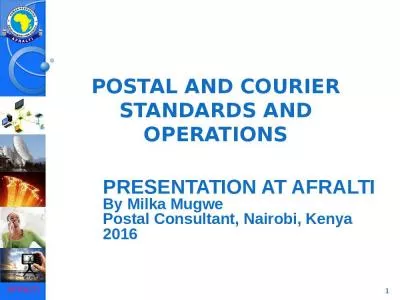PDF-POSTAL MANUAL VOLUME V POST OFFICE AND RAILWAY MAIL SERVICE GENERAL
Author : taylor | Published Date : 2022-08-16
CONTENTS CHAPTER NO SUBJECT 1 Definitions 2 Miscellaneous Rules 3 Investigations 4 Transmission of mails under the weighment system APPENDIXI Rules relating to treatment
Presentation Embed Code
Download Presentation
Download Presentation The PPT/PDF document "POSTAL MANUAL VOLUME V POST OFFICE AN..." is the property of its rightful owner. Permission is granted to download and print the materials on this website for personal, non-commercial use only, and to display it on your personal computer provided you do not modify the materials and that you retain all copyright notices contained in the materials. By downloading content from our website, you accept the terms of this agreement.
POSTAL MANUAL VOLUME V POST OFFICE AND RAILWAY MAIL SERVICE GENERAL: Transcript
Download Rules Of Document
"POSTAL MANUAL VOLUME V POST OFFICE AND RAILWAY MAIL SERVICE GENERAL"The content belongs to its owner. You may download and print it for personal use, without modification, and keep all copyright notices. By downloading, you agree to these terms.
Related Documents














